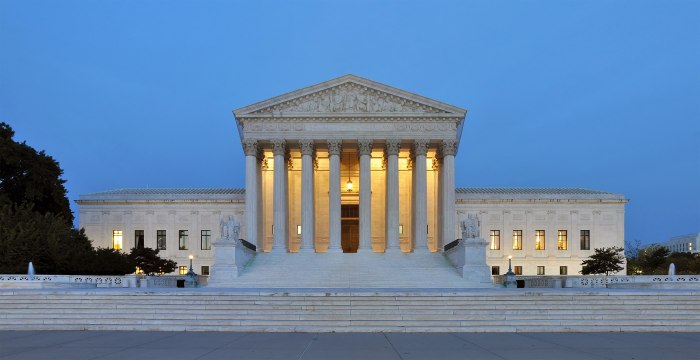State Supreme Court finds bio-mom’s ex has legal standing; NYS precedent that much more outdated
Joining a growing list of other state courts, the Nebraska Supreme Court has adapted the common law doctrine of “in loco parentis” –– generally translated as “in the place of a parent” –– which is used to consider the parental rights of stepparents and grandparents, to provide a basis for allowing same-sex co-parents to preserve their relationships with children after they end their union with a biological or adoptive parent.
Justice Lindsey Miller-Lerman wrote the opinion for the court’s 6-0 ruling on August 26.
Teri A. Latham and Susan Rae Schwerdtfeger met in college and began living together in 1985. When the couple decided to have a child, they agreed that Schwerdtfeger would be the birth mother. After several unsuccessful attempts using artificial insemination, Schwerdtfeger, making use of in vitro fertilization, was successful in bearing their son, identified in the court’s opinion as P.S., in 2001. The women shared parenting duties and expenses, and the child called Latham “Mom.”
By 2006, however, the relationship broke down and Latham moved out of the family’s home. She continued to maintain a relationship with P.S. in visits and by telephone, but Schwerdtfeger began reducing the frequency of that contact until, by 2009, it had become slight. Latham stopped contributing financial support when the women terminated their joint bank account in 2007.
Latham filed a lawsuit in Douglas County District Court in 2009, seeking an order of custody and visitation. Judge Marlon A. Polk concluded that since she was neither the biological nor adoptive parent of P.S., she lacked standing. Nebraska’s “in loco parentis” doctrine would not apply where the plaintiff had no legal relationship with the child’s parent, he found, in dismissing the case.
Polk also ruled that even if Latham had standing, the facts would not support her claim to parental rights.
Nebraska has no intermediate appellate court, so Latham’s appeal went directly to the State Supreme Court.
Pointing to the ways Nebraska courts have applied “in loco parentis” to stepparents seeking to preserve a relationship with their former spouse’s children and, in one case, to grant parental rights to a grandparent who had formed a parental bond with a child, Justice Miller-Lerman, wrote, “A person standing in loco parentis to a child is one who has put himself or herself in the situation of a lawful parent by assuming the obligations incident to the parental relationship, without going through the formalities necessary to a legal adoption, and the rights, duties, and liabilities of such person are the same as those of the lawful parent.”
Unlike stepparents and grandparents, however, under Nebraska law, which forbids same-sex marriage and extends no domestic partnership rights, Latham did not at any time have a legal relationship to Schwerdtfeger recognized by the state.
To explore Latham’s relationship to P.S., the court conducted an extensive review of rulings in other states and scholarly articles, and found a clear trend of applying the “in loco parentis” doctrine to same-sex couples who had been raising children together. Miller-Lerman quoted extensively from rulings in Pennsylvania, Washington, Wisconsin, and Arkansas, all of which concluded it was appropriate to recognize a same-sex co-parent’s standing to seek custody or visitation after a break-up with the child’s biological or adoptive parent. (The prevailing precedent in New York State, dating to the 1991 decision from In the Matter of Allison D., is otherwise, making this one area of lesbian and gay family law in which the Empire State lags woefully behind.)
“The focus of an in loco parentis analysis must be on the relationship between the child and the party seeking in loco parentis status,” Miller-Lerman noted, in summarizing the conclusions from other states. The critical issue is whether a parent-child bond was formed during the time the plaintiff participated in parenting the child.
Quoting from a Pennsylvania ruling, Miller-Lerman wrote, “While it is presumed that a child’s best interest is served by maintaining the family’s privacy and autonomy, that presumption must give way where the child has established strong psychological bonds with a person who, although not a biological parent, has lived with the child and provided care, nurture, and affection, assuming in the child’s eye a stature like that of a parent.” In such cases, the Pennsylvania court concluded, “the third party [should] be granted standing so as to have the opportunity to litigate fully the issue of whether that relationship should be maintained even over a natural parent’s objection.”
The Nebraska court noted the doctrine “must be applied flexibly,” but found that the district judge clearly erred in concluding as a matter of law that it did not apply, since there was uncontested evidence that Latham played a full parental role during the early years of P.S.’ life.
The trial judge’s error, said the court, was in focusing on the relationship between the two woman –– and particularly on its breakdown –– rather than on Latham’s bond with the child.
The ex-couple must now return to trial court to litigate the issue of whether the child’s best interest is served by allowing Latham to re-establish her parental relationship with him. There are differing factual accounts from the two women over Latham’s relationship with P.S. after she moved out in 2006.
Surprisingly, attorneys on both sides of the case offered praise for the ruling, according to the Associated Press. Tyler Block, one of Latham’s attorneys, said, “They applied Nebraska law and helped give clarification on how it applies in these particular situations.” Angela Dunne Tiritilli, representing Schwerdtfeger, though saying her client was disappointed that years of litigation await her, added, “What we’re seeing here is a good trend; the court is not simply dismissing same-sex parental rights.”
An amicus brief from the National Center for Lesbian Rights supported Latham’s argument regarding the “in loco parentis” doctrine.



































